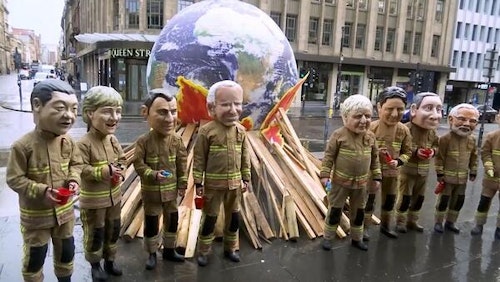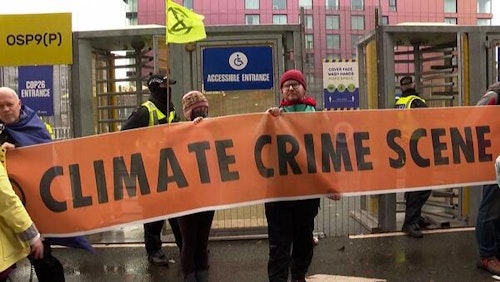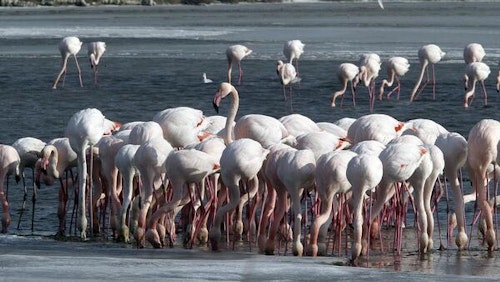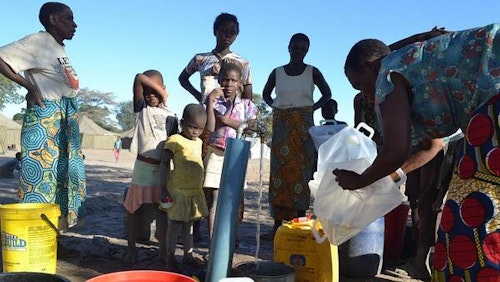Almost 200 nations adopted a climate deal on Saturday, including a last-minute amendment from India weakening critical language on coal.
After two weeks of contentious talks, almost 200 countries adopted on Saturday a compromise climate deal aimed at keeping a key global warming target alive.
 ADVERTISEMENT
ADVERTISEMENT
 ADVERTISEMENT
ADVERTISEMENT
But the final agreement of COP26 included a last-minute amendment from India watering down critical language on coal.
Here is what you need to know as COP26's last day wraps up:
What was India's last-minute change?
As the plenary session to adopt the deal started, India proposed a last-minute amendment replacing coal "phase out" with "phase down".
The text now reads as follows: "including escalating efforts to phase down unabated coal power, and phase out inefficient fossil fuel subsidies."
Earlier, India, Iran and a few other countries voiced their opposition to references to phasing out coal and fossil fuel subsidies.
Many delegates expressed their deep disappointment at India's proposal. Negotiators from Switzerland and Mexico called the coal language change against the rules because it came so late.
But all said they had no choice but to accept it.
What else is in the deal?
The deal says big carbon polluting nations have to come back and submit stronger emission cutting pledges by the end of 2022.
It urges rich nations to "at least double their collective provision of climate finance for adaptation to developing countries."
The text does not set up specific financing facilities for Loss and Damage, a crucial demand of developing countries. But Guinea, speaking on behalf of the G77 countries, said the bloc could "live with it."
It also solves a long-standing problem to pave the way for carbon trading.
What are the reactions so far?
Conference President Alok Sharma said the deal drives "progress on coal, cars cash and trees'' and is "something meaningful for our people and our planet.''
"Our fragile planet is hanging by a thread," United Nations Secretary-General Antonio Guterres said in a statement. “We are still knocking on the door of climate catastrophe.”
“It’s painful that diplomatic efforts have once more failed to meet the scale of this crisis," said Gabriela Bucher, Oxfam International Executive Director.
Check out our blog for more details:

 ${title}
${title}
Live ended
Deal has been adopted with India's amendment
'It's vital that we protect this package,' says Sharma
Countries react to India's proposal
India seeks to water down paragraph on coal exit and phaseout of fossil fuels subsidies
Watch live: Formal plenary to adopt final COP26 agreements
Climate group says fossil fuel phase-out in Glasgow Pact 'tiny' but 'significant' step
COP26 presidency has uploaded new proposal for Glasgow Pact
Formal plenary to convene 'shortly', says Sharma
Cuba unhappy but won't veto deal
Iran joins coalition of countries against fossil fuel phaseout
Text should be balanced 'in implementation', says Indonesia
Chinese envoy urges compromise
Speaking earlier in plenary, China urged delegates to make compromises.
"Currently this text is by no means perfect, but we have no intention to open the text again," said Zhao Yingmin, head of the Chinese delegation to COP26 and vice minister of the Ministry of Ecology and Environment.
"We should meet each other halfway. We have noted that all parties have their own concerns on core issues. China hopes that all parties will show maximum flexibility and constructiveness at this final stage," he added.
With AFP
'Perfect is the enemy of the good,' says Kerry
'We must move forward today' says Grenada's delegate
Costa Rica 'will support this package as it is'
EU climate chief warns of 'risk of stumbling' before finish line
India tries to block coal phaseout from COP26 deal
Bhupender Yadav told negotiators on Saturday that there was no consensus on key issues and blamed “unsustainable lifestyles and wasteful consumption patterns” in rich countries for causing global warming.
With AP
Maldives says draft deal falls short on Loss and Damage
Small island nations have long pushed for an independent compensation mechanism for irreversible losses caused by climate change.
But the current proposal at the talks at COP26 fall short of what is needed to bridge the gap between developed and developing worlds, Maldives minister Aminath Shauna said Saturday.
“I still have not found text and language that can bring both parties together on this issue.” she said.
The draft proposal published in the morning said participating nations had decided to “establish dialogue” on this issue of compensation for climate damages.
This is not enough urgency when hurricanes and floods are impacting essential services like drinking water in the Maldives, Shauna said.
But she also acknowledged that the mention was a slight win that took a lot of work for many years and therefore “we don’t want it to be removed entirely.”
With AP
Guinea 'can live with' draft text on Loss and Damage
COP26 chair implores delegates 'not to seek more' for their countries
He said that “collectively our climate ambition and action to date have fallen short on the promises made in Paris” six years ago but the latest draft agreements offered tangible steps and milestones to get there.
Sharma urged countries to take a short break to formalise the proposals before reconvening later Saturday to pass them.
Watch live: COP26 chair holds informal stocktaking plenary after release of draft deal
COP26 chair says informal stocktaking plenary postponed to 2:30p Glasgow time
Key points in the new draft deal
- Like the previous version, the new draft calls upon countries to accelerate "efforts towards the phase-out of unabated coal power and inefficient fossil fuel subsidies."
- A new addition refers to "the need for support towards a just transition,'' a reference to calls from those working in the fossil fuel industry for financial support.
It does not set up specific financing facilities for Loss and Damage, a crucial demand of developing countries.
It requests countries to come back next year with updated climate targets.
It urges rich countries to "at least double their collective provision of climate finance for adaptation to developing country."
What's the state of play on carbon markets?
The new draft text provides "strong'' provisions to prevent double-counting of offsets -- a longtime point of contention -- and allows about 100 million tons of carbon credits to be carried over from previous years and agreements.
Analyst says Loss and Damage row could jeopardise Saturday wrap up
Alden Meyer, senior associate at climate policy think tank E3G, told AFP that loss and damage talks were a "cliffhanger moment" that could jeopardise the UK's goal of wrapping the summit up later Saturday.
The comments come after a proposal to include the creation of a dedicated facility to administer loss and damage support was scrapped by historic emitters, delegates said.
Countries already battered by climate disasters such as record-breaking drought, flooding and storms are demanding they be compensated separately for loss and damage, and have made it a red line.
Amadou Sebory Toure, head of the G77+China negotiating bloc, told AFP the proposal was "put forward by the entire developing world, representing six of every seven people on Earth".
He said separate finance was needed "to effectively respond to our needs to address the loss and damage being inflicted on our peoples, our communities, our economies, by the impacts of climate change".
With AFP
Climate activists say new draft deal is 'betrayal' by rich countries
New draft deal 'still not good enough', says Oxfam

Watch: Activists dress as world leaders in COP26 protest
Activists on Friday posed as world leaders incapable of putting out the fire as the planet burns. Dressed as firefighters, the mock world leaders did little to tackle the climate crisis and to save a planet "on fire".Greenpeace warns countries may try to scrap line on fossil fuel from COP26 deal
What does the new draft say about climate targets?
The draft deal released this morning says countries are "encouraged" to submit new targets for emissions reduction for 2035 by 2025, and for 2040 by 2030, establishing a five-year cycle.
Previously, developing countries were expected to do so only every 10 years.
It says that to limit global warming to 1.5C, countries will need to make “rapid, deep and sustained reductions in global greenhouse gas emissions, including reducing global carbon dioxide emissions by 45% by 2030 relative to the 2010 level and to net-zero around mid-century, as well as deep reductions in other greenhouse gases.”
Scientists say the world is not on track to meet that goal yet, but various pledges made before and during COP26 have brought them closer.

Watch: Hundreds protest at COP26 as negotiations draw to a close
Hundreds of civil society representatives at the COP26 conference chanted on Friday as they marched through the convention centre, denouncing the conference as a "failure."'Informal stocktacking plenary' scheduled at 12p Glasgow time
"I envisage formal plenary meetings in the afternoon to adopt decisions and close the session on Saturday," Alok Sharma, president of the COP26, said in a statement yesterday.
Activist slams scrapping of Loss and Damage facility
What does the new draft say about fossil fuels?
But in a new addition, the text says nations will recognise “the need for support towards a just transition.”
This is a reference to calls from those working in the fossil fuel industry for financial support as they wind down jobs and businesses.

Watch our report: This flamingo paradise in France is threatened by rising sea levels
The rise in sea level will cause irreversible changes to the Camargue's unique ecosystem.No Loss and Damage mechanism in new draft
The new draft calls upon countries to "accelerate efforts towards the phase-out of unabated coal power and inefficient fossil fuel subsidies."
On this key point, it uses the same wording as the previous version which was criticised for using weaker language than the first draft.
A previous version published on Wednesday had called on countries to "accelerate the phasing out of coal and subsidies for fossil fuel."
The new draft text does not set up specific mechanisms for Loss and Damage, a crucial demand of developing countries.











